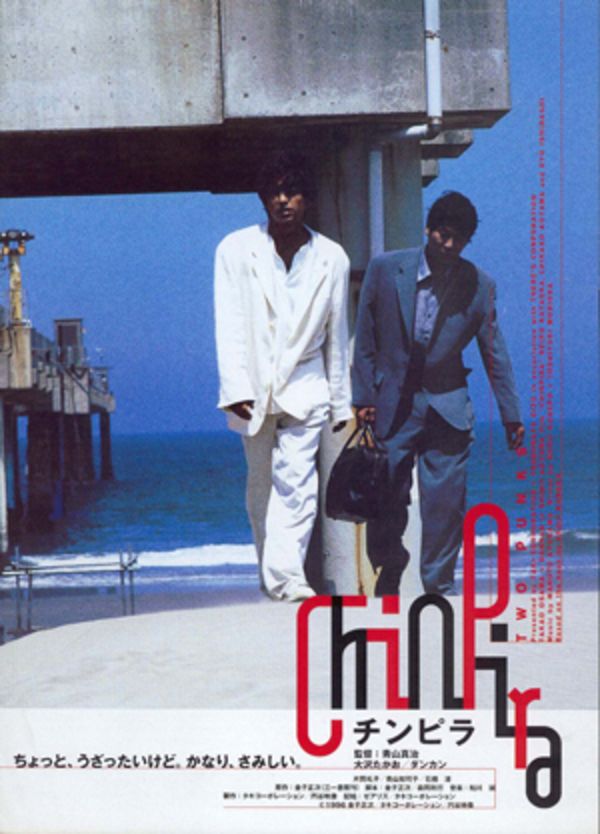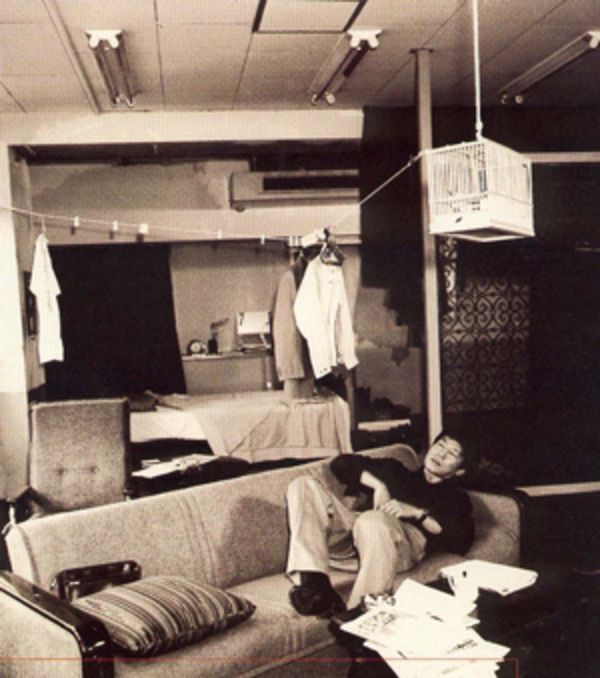
Cast
Osawa Takao, Dankan, Kataoka Reiko, Aoyama Chikako, Ishibashi Ryo, Terashima Susumu, Mitsuishi Ken
Staff
Director: Aoyama Shinji
Producers: Kai Naoki, Nagasawa Katsuaki, Okagawa Akimoto
Screenplay: Kaneko Shoji, Morioka Toshiyuki
Story: Kaneko Shoji
Director of photography: Ishii Isao
Lighting: Mihagi Kuniaki
Art Director: Nitta Takayuki
Music: Ayuakawa Makoto
Editor: Onaga Masahiro
Sound Recordist: Nakayama Takamasa
Script Supervisor: Sato Kumi
Executive producers: Takiguchi Yasuaki, Tsuburaya Akira
1996/ JAPAN / 35mm / COLOR / MONORAL / 1:1.85 / 101min. / 6 reels
Story
Arriving from Shikoku, Yoichi (Takao Osawa), finds a job at a night club. One night Yoichi cause trouble at the club as he catches a junky (Ken Mitsuishi) shooting up in the men's room.
The night club manager, Matsuo (Susumu Terashima) is infuriated, but Otani (Ryo Ishibashi), the club owner and the boss of the gangster family, takes an interest in the young man. Yoichi is overpowered by Otani's strong presence.
Michio (Dankan) also works at the same nightclub. In fact, he was the one who recruit Yoichi to this job. Already 35 years old, Michio is still a bachelor with no concrete plans for the future. He is more interested in playing everything safe, and seem to have no ambition.
Although completely different from Yoichi who has a chip on his shoulder, Michio finds companionship in him. Likewise with Yoichi, who moves in with Michio, and they enjoy their life together like brothers, and spend most of their time fooling around like. While Michio is submissive to Matsuo, Yoichi finds it hard to abide by the man's rules. And Yoichi boldly reveals his antagonism towards him.
One night Yoichi witnesses Matsuo and his moll, Yuko (Reiko Kataoka), quarrelling. Seeing Matsuo beat the woman, Yoichi steps in. After a ferocious fist fight, Matsuo stabs Yoichi with a knife and walk off. Wounded, Yoichi leams that Yuko has been attracted to him. The two exchange their affections.
Under Boss Otani's supervision, Yoichi and Michio become bookies for the horse races. Frequenting Boss Otani's house, they discover that Boss Otani and his moll, Miya (Chikako Aoyama) have lost their passion for each other. Michio soon learns Miya is trying to impress him.
One day, Yoichi walks of the apartment after a quarrel with Michio, and temporarily moves in with Yuko. During Yoichi's absence, Miya, who has left Boss Otani, jumps in. She confides in him that Otani is on drugs. "Because he's scared of being ayakaza (gangster)" she tells him.
When Yuko begged him to becomes straight and start life anew with her, Yoichi is confused. Taking a walk to a nearby park, he runs into Michio, who report to him that Miya is pregnant with his child. Surprisingly, Boss Otani agrees free Miya from his bond to start a new life with Michio. With his eyes losing lustre, Yoichi no longer detects the beastly violence of this man when he first saw him, pushing a chopstick into a junky's ears. A few days later Boss Otani is killed by the junky he once brutalized.
With Otani's death, the emptiness which was lingering within Yoichi begins to expand. He cannot respond to Yuko's wish to leave Tokyo and live in some seaside town. Retuming to her apartment one day, he finds the room empty. Yuko has left. And from this day, Yoichi lives in hollowness, a void he cannot escape from.
Doing some time in prison, Matsuo has become a full fledged member of the family. Bringing his goons along, he raids Yoichi's apartment looking for Michio. Yoichi flabbergasted, but soon learns that Michio has embezzled the family's money and took off. Remembering Michio talking about his hometown, Yoichi arrives at a seaside village. He tracks down Michio, and tries to convince him to return the money, but Michio is determined to keep on running. Only a lonely beach, Yoichi and Michio fool around as if time has frozen. Yoichi suggest they both produce a finger each in the yakuza style to express their apology to the family. To borrow a knife to cut off their fingers, Yoichi leaves the beach, leaving Michio behind. When Yoichi is about to return to Michio, he gasps as he sees Matsuo's car parked at the edge of the beach.
Yoichi has lost his sense of time, but finds himself left all alone on the beach.
 Interview Shinji Aoyama
Interview Shinji Aoyama
Question: What was your involvement in revising Kaneko's screenplay?
Aoyama: Well, I worked with Toshiyuki Morioka to revise it to suit the budget. It was also the producer's wish to have the film made as faithful as it can to Kaneko's original work. But we decided to update the setting to present day, and tone down on portions with rather exaggerated praises on the gangsters' lifestyle. I also suggest that the part where Michio runs off with the money should be set in a seaside town, instead of Tokyo. This in actuality became the climatic scenes. The reason is quite simple. Shooting Tokyo on location doesn't appeal to me.
Q: Do you make change in the script while you're shooting?
A: Not very often. I make more changes during the editing. I even take out a whole scene. But in this film, in the scene when Boss Otani first appears, I made some changes. The song he sings is that of a banana vendor in Kita Kyushu. It was Ishibashi's idea.
Q: How do you choose you location sites?
A: In my case, most of the location sites are decided quite easily. I indicate several terms, and if they are cleared, it's fine with me. I'm not very fussy. The beach in Chinpira was instinctive. I saw it and I knew it was what I wanted. The dune and the fog were the winning factors.
Q: The building roof and the weathercock appear repeatedly and are very impressive.
A: The roof belongs to an apartment building. I fell in love with the iron structure and the spiral stairs. I also like the fact that the iron structure and the street below can be captured in the same frame. I found the iron weathercock, too, and thought it suit well with the iron structure.
Q: The scene with the fist fight between Yoichi and Matsuo was also on the building roof, wasn't it?
A: It was possibly a reflection my preference on horizontal changes. I don't places where you cannot feel the difference in height or to put it simply Jlat. I intended to symbolize the characters' fate by shifts in elevation.
Q: In Helpless, you undertook yourself. Why did you collaborate with Makoto Ayukawa this time?
A: Since my junior high school days, Mr. Ayukawa was my guitar hero. He was the only person I want to work with in the Japanese music scene. I predicted his guitar has such an impact, because it expresses certain emotions or situations with such fluency as to match the power of the dialogue or the situations. I was right. At times, his music abruptly and violently jumps in as if to wage war on the picture. I think his guitar is the greatest treat in my film.
Q: How as his music recorded?
A: At a studio where we provided a video of the film and had him play along scene by scene. But we could tell he was not comfortable. We come to the conclusion that the best results could be if attained by having him play at random without the video, and pick out the part we like later on. I also joined him in the latter part in the beat department.

